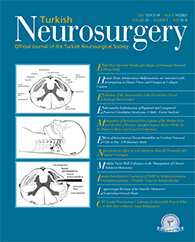2Ataturk University, Faculty of Medicine, Department of Biochemistry, Erzurum, Turkey
3Ataturk University, Faculty of Medicine, Department of Pharmacology, Erzurum, Turkey
4Ataturk University, Faculty of Medicine, Department of Pathology, Erzurum, Turkey DOI : 10.5137/1019-5149.JTN.6651-12.1 AIM: The purpose of this trial was to investigate the effect of a well known immunomodulator -interferon beta- on traumatized spinal cord in terms of biochemical and histopathological features.
MATERIAL and METHODS: Twenty-four rats were used in this trial. The rats were divided into 3 groups. In the first group of rats, spinal cord injury was created by the weight drop method and interferon beta was administered. In the second group, physiological saline was administered. Third group was used as control. Rats were sacrificed 24 hours following trauma. Heat shock protein 70 levels were measured in the spinal cord samples and the samples were examined histopathologically.
RESULTS: When the rats in the physiological saline and control groups were compared to rats treated with interferon beta 1b, those treated with interferon beta 1b revealed significant increases in the heat shock protein 70 levels in tissues, and histopathological examination revealed decreases in polymorphonuclear leucocyte infiltration, haemorrhage, oedema and necrosis.
CONCLUSION: Although, the results of the study indicated that interferon beta might have some healing effects via increasing the cellular heat shock protein 70 on spinal cord injuries, more studies are needed.
Keywords : Heat shock protein 70, Interferon beta, Spinal cord injury




